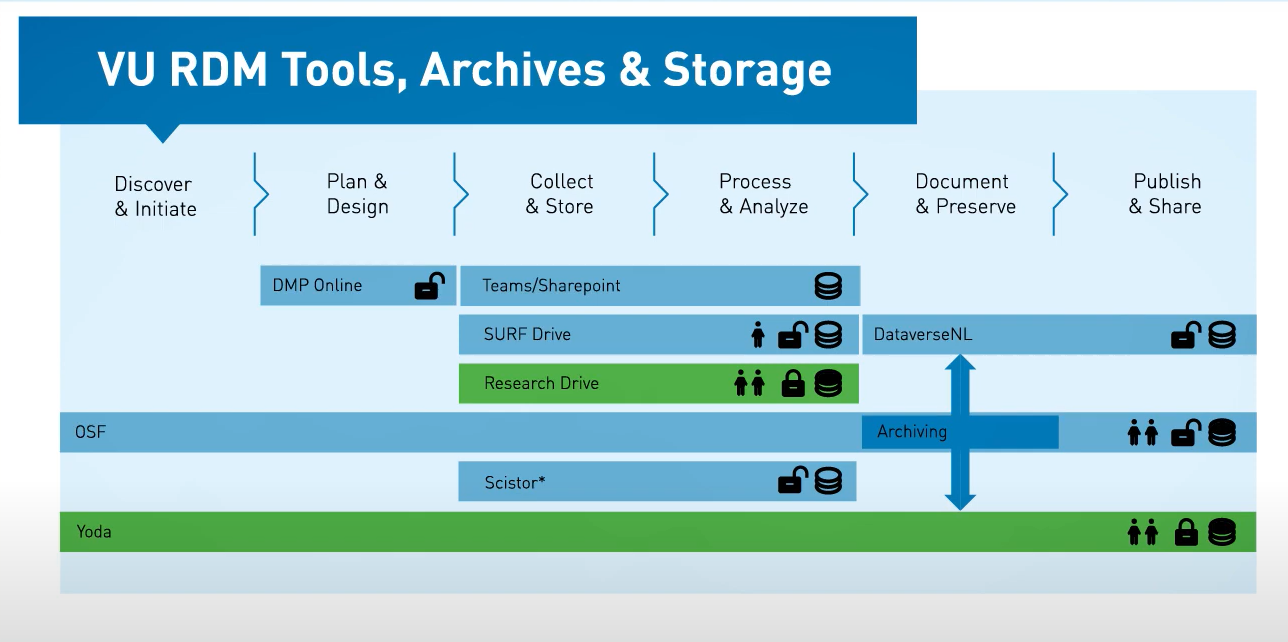RDM: Tools
The figure below gives an overview of the tools that are available throughout the research lifecycle.

Faculty-specific advice and guidance on which tools are recommended is provided in the table below. If you would like to use other tools, feel free to contact the Faculty Data Steward for more information. More general information about the data management tools provided by the VU can be found on the Research Data Support Portal. Information about costs can be found here.
| Tool | FSS Guidance | How to get started |
|---|---|---|
| Storage Finder | The storage finder offers information about all storage options offered for research data, even those not typically used in the faculty of social sciences | https://vu.nl/en/research/storagefinder |
| DMP Online | All work you do on data needs to be covered by a DMP in the VU template on DMP Online. This is because both your department head and the Dutch privacy regulator need to be able to have insight into what happens to the data used in the faculty. This is facilitated by DMP Online. |
If, for whatever reason, you have a DMP elsewhere, you can fill out the shortened “GDPR registration form” on DMP Online to ensure transparency. |Visit https://dmponline.vu.nl, log in with your institutional credentials, and start writing!
If you are not sure about what to enter, please don’t spend hours researching the answer: you can always schedule a session with the Faculty Data Steward. | |Yoda |Yoda is the preferred solution for storing and archiving data at FSS. It is rated for sensitive data, can be used with (external) collaborators, and allows for secure access both on and off campus.
Data can be added to a “vault” to preserve a persistent copy. This copy can be assigned metadata, a DOI,and (optionally) be published. |Visit yoda.vu.nl, fill out the request form, and the functional manager of yoda will schedule an intake with you. | |Research Drive |Research Drive can be used to store data during your research, but, unlike yoda, can’t be used for archiving or publishing. It does have two advantages over Yoda. Firstly, it offers fine-grained access control to sub-folders. This allows you to specify folder which team members can access it. For example, you can choose not to give students access to senstive materials. Secondly, it offers better syncing, allowing you use more effectively offline.
Because of the lack of archiving options, you will mostl likely have to combine Research Drive with Yoda. |Visit https://services.vu.nl/esc?id=kb_article&sysparm_article=KB0012856 for more information and a request form. | |OSF |The OSF is great for making your work more transparent, pre-resgistering studies and publishing data. |There is much information on OSF.io; VU has an institutional account with the OSF, meaning you can log in with your VU credentials. | |Teams / SURF Drive |While Teams and SURF Drive are great for collaboration with colleagues and students, we recommended not to use them for storing research data since the backup and security features of other storage solutions such as Yoda and Research Drive are much more robust. |Access to Teams and SURF Drive is standard for all employees. |